Navigation
WOLF Forest Protection Movement Helps Save Slovak Forests
The WOLF Forest Protection Movement is an environmental non-profit non-government organization (NGO) working to preserve natural forests and their wildlife in Slovakia and the whole of Central and Eastern Europe. It was established in 1993 as a Slovak movement of friends of forests. The organization was founded by members of the SZOPK (Slovak Union of Nature and Landscape Preservers) group. WOLF, lead by Juraj Lukac, has worked in the forests of the Saris region in eastern Slovakia since 1980. The experience of this group became a basis for the practical activities of the WOLF Forest Protection Movement.
Location:
Slovakia
Problem Overview:
Slovakia is a small central European country covering a total area of 49,000 km2 of which almost 40% is still forested. It has the last remnants of the natural beech-fir forests, which in the past covered the majority of Europe. In these areas, animal and plant species are still concentrated in naturally high densities while in many other European countries they have become extinct.
Its forests are home to a remarkable range of wildlife including around 250 wolves, 800 bears, 400 lynx, 1000 wild cats, 70 pairs of golden eagles plus deer, wild boar, ten species of owls, endemic Carpathian plants and much more. Besides ensuring ecological stability of the landscape, these forests are important to Europe as a source of genetic information and a refuge for natural ecosystems that can provide a source of regeneration for the stability of the heavily damaged landscape of other European countries. These forests are for Europe what old-growth rain forests are to the rest of the world.
The main border between the Black and Baltic Sea watersheds is also located in this region. All the water in the north flows to the Baltic Sea and in the south to the Black Sea. If water is not retained in Slovakia, it just flows away. That’s why Slovakia is called the "roof of Europe." Protecting natural forests "on the roof" will preclude the necessity of Slovakia becoming a "cement" country covered by artificial dams. By saving these forests and their wildlife WOLF is fighting for a stable landscape for our future generations.
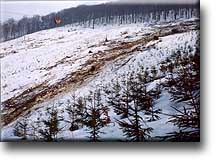 |
| Destructive logging, halted by WOLF onsite direct action |
Unfortunately these forests are threatened with unsustainable forest management practices which have caused the deterioration of the ability of the land to accumulate and retain water in micro-watersheds. It has deteriorated two or even three fold within the last 60 years. The main reasons for the steady deterioration of the natural environment in Slovakia are:
- ecologically improper clear-cut logging which is practiced on 40% of forest stands;
- using improper logging technology and equipment;
- reforestation with non-native tree species resulting in 70% loss;
- using streambeds for skidding wood;
- leaving insufficient biomass in the forest stands which affects qualitative structure and diversity of the nutrient chain and reduces nutrients in soil needed for a future generation of forests;
- building new forest roads that increases soil erosion and surface water runoff, mainly in flysh areas;
- and hunting predators, mainly wolves, that has resulted in an overpopulation of herbivores causing reduction of natural forest regeneration.
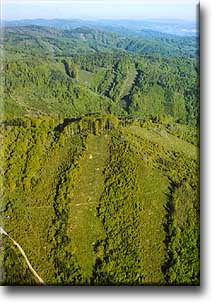 |
| Example of bad forest management; clearcutting in the Cèrgov mountains |
The importance of the existence of natural forests and of their water retention function has been proven by a number of studies and unfortunately, by tragic floods in 1997 and 1998. The comparative water retention ability of forests in Slovakia was very vividly demonstrated at that time. In areas with natural forest ecosystems, almost no damage was caused even after extreme rainfalls. On the other hand, areas with altered forest ecosystems suffered enormous flooding and resulted in over 50 deaths in eastern Slovakia. It is sad, but Juraj Lukac, WOLF’s chairman, predicted these disastrous floods as early as 1992. At that time WOLF was not influential enough to effect changes.
The WOLF Forest Protection Movement is an environmental non-profit non-government organization (NGO) working to preserve natural forests and their wildlife in Slovakia and the whole of Central and Eastern Europe. It was established in 1993 as a Slovak movement of friends of forests. The organization was founded by members of the SZOPK (Slovak Union of Nature and Landscape Preservers) group. WOLF, lead by Juraj Lukac, has worked in the forests of the Saris region in eastern Slovakia since 1980. The experience of this group became a basis for the practical activities of the WOLF Forest Protection Movement.
Juraj, an Ashoka Fellow, has been a chairman of the WOLF Forest Protection Movement since its establishment. Under his leadership what started as a group campaigning for protecting the Cergov Mountains in eastern Slovakia spread to a nation-wide movement with representatives in all regions of Slovakia.
The headquarters are in Tulcik, a small village in eastern Slovakia close to the Polish and Ukrainian borders. At present WOLF has 340 registered members and over 1,000 friends and supporters.
WOLF’s organizational structure is composed of "tribes", with each tribe adopting a mountain range in Slovakia. They monitor foresters’ and hunters’ activities and promote sustainable close-to-nature forest management practices. Currently there are five official tribes caring for the Cergov, Slanske, Polana, Eastern Carpathian and Tatra Mountains. WOLF’s members also monitor forests in other mountain ranges in Slovakia. The main objective in regards to organizational development is to have 52 groups in Slovakia with each adopting a mountain range.
Currently there are four people working in Tulcik and two people working fulltime in other tribes. Over fifty volunteers regularly help us with various activities.
The coordinating body is the Council of Elders formed from leaders of all five tribes. A Technical and Scientific Board supports WOLF with scientific studies, consultations and advice. At present, the board consists of 13 members including world renowned experts on sustainable forestry, ecology of forests, zoology, entomology, chemistry, and ecological ethics from Slovakia, Poland, Czech Republic, USA and Australia.
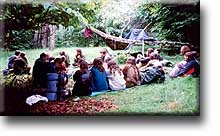 |
| National meeting of WOLF members in WOLF's forest preserve |
Under the leadership of Juraj WOLF has developed a variety of strategies to stop the destruction of natural forests by working at all levels - regional, national and international. All activities are conducted within four main programs:
- “Save Forests” - voluntary hands-on projects in adopted mountains, including tree planting and protection of habitat, creation of nature reserves to protect some of the best areas of remaining natural beech-fir forests, monitoring work including monitoring balloon flights, lobbying and petitioning for changes in legislation (Forest, Water, Game and Firearms Acts), preparation of scientific studies, demonstrations and direct actions against destructive forest management practices, public and media campaigns,
- “Save Predators” - monitoring and guarding dens of wolves and lynx and nests of Golden eagle, putting up nesting boxes for Ural owls to help offset habitat losses, public and media campaigns,
“Gaia - Our Home” - educational program for the general public including lectures, consultations and 8-day field seminars in a forest,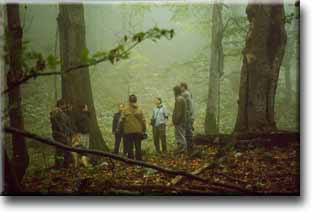
Field seminar in Busov mountains near the border between Slovakia and Poland. Photo shows participants during a day of lectures by friends from the Workshop for All Beings on the theme: "Magic Circles"
- “ABIES Publishers - Publishing House of the WOLF Forest Protection Movement“ - publishing books (all on recycled paper) on eco-philosophy, deep ecology and new views on forests and animals. The editorial plan has no analogy in Slovakia. The publications are mostly of published material translated into the Slovak or Czech language and distributed in both Slovakia and the Czech Republic.
On the international level, WOLF cooperates closely with forest protection groups in Poland, mainly with Workshop for All Beings and a group called Zrodla and in the Czech Republic mainly with Hnuti DUHA/FoE - Czech Republic.
WOLF is a co-founding member of Friends of the Earth-Slovakia and a member of the Taiga Rescue Network, International WOLF Federation, Native Forest Network, and European Mountain Forum.
WOLF has achieved success with many of its efforts:
- In 1993 it influenced the Forest Law. Since then, clear-cutting, once the only management method used in Slovak forests, has become the least favored logging practice. It contributed significantly to the decrease of clearcut logging from 70% of forest stands to current 40%.
- In 1993 it influenced forest management plans for the Cergov Mountains to significantly decrease clear-cutting and to implement less harmful logging practices as espoused by WOLF.
- In 1994 WOLF stopped a World Bank forestry loan for the project “Ecological Management in Forests in Slovakia” which would have tripled logging in Slovak forests. In both structure and content the project as a whole was not directed toward helping preserve the Slovak forests but, rather, to help support forestry administration and management (described in the leaflet “Save Slovak Forests,” available in Slovak and English).
In 1996 WOLF saved forests at the Oblik Hill in the Slanske Mountains from clear-cutting.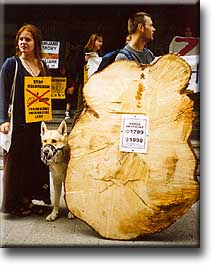
Protest against destructive logging of the Polana Biosphere preserve.
- In 1998 WOLF stopped the implementation of 234 clear-cuts in the Polana UNESCO Biosphere Reserve (described in the leaflet “The Truth on the Polana” available in Slovak).
- In 1998 WOLF established ownership and control of two natural beech-fir forests in Slovakia with a total area of 58 hectares (a 37 hectare forest has been donated and 21 hectare forest is being purchased).
In 1999 it influenced the environmental evaluation statement of the International Olympic Committee on Slovakia’s candidacy for hosting the Winter Olympic Games in 2006 which would have threatened two national parks (including nature reserves) with extensive clear-cut logging (leaflet “Forest for Life, Not for Death” available in Slovak and English).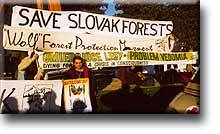
A protest against logging in national parks under pretext of Winter Olympic candidacy
- WOLF planted hundreds of thousands of native tree species in degraded forests using a method of replanting wind-spread seedlings from forest roads into nearby clear-cut areas and spruce monoculture forest stands.
- In order to implement the project of saving the forest by its purchase, WOLF had raised over two-thirds of the purchase price, i.e. 2,390,000 out of the 3.2 million Slovak crown cost of the forest by the end of last year. The money, 1,390 contributions, was mainly contributed by individuals of which over two-thirds are from Slovakia and almost one-third are from other countries all around the world (the project is described in the leaflet “Help Save Natural Forests/Buy Your Own Tree” and available in Slovak, English and Polish).
- WOLF has been organizing a petition, “For a Change in the Forest Law”, which has been signed by 15,000 people and submitted to the National Parliament of the Slovak Republic. The petition continues.
Under the leadership of Juraj Lukac, both organizations, WOLF and its sister organization The Green Perspective Foundation (GPF), each have been awarded three prizes for their achievements. They are: the Sasakawa Peace Foundation Environmental Award (both), Henry Ford European Conservation Awards (both), the Environmental Partnership Award (GPF) and a prize for the best working Slovak NGO with media awarded to WOLF by Foundation for the Support of Civic Activities.
Buy Your Own Tree Project: Preservation of the WOLF Reserve
The Cergov Mountains are an isolated unit in the outer Western Carpathians, and are part of the eastern Beskydy area, the most massive mountain unit of this region. This is an upland area rising to a little over 1,000 meters and encompassing 600 square kilometers of forest. It was originally almost entirely beech-fir with some maple, sycamore, willow and other tree species. It is being steadily cut and replanted with faster-growing non-native species such as Norway spruce and European larch.
These natural beech-fir forests of eastern Slovakia are the rainforests of Europe. Their natural value is such that WOLF believes it is its duty to try all possible means to secure their preservation. WOLF decided to purchase a part of the forest in order to save it. WOLF calls this effort its "Help Save Natural Forests/Buy Your Own Tree" project.
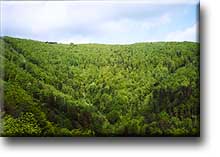 |
| The forest of the WOLF Forest Protection Movement |
This started in early 1997 when the 21 hectare beech-fir forest in the middle of the Cergov Mountains was offered for sale by a private owner. This area called ‘The Wolf Reserve’ is over 100 years old. Its beech trees, interspersed with fir, maple, birch and ash trees, provide a habitat for a wide range of animals. Since it is not fenced, wolves, lynx, and other wildlife can freely come and go. Within the boundaries of The Wolf Reserve they will be fully protected.
To raise the 3.2 million Slovak crown required for the forest, WOLF launched a campaign entitled “Buy Your Own Tree” in summer of 1997. Since then it has been asking people to symbolically buy one tree for US$ 30. WOLF pledged that not one of these trees will be cut or removed from the forest even when dead. Fund-raising events were organized to support the campaign, such as a benefit concert and herbal tea selling at a secondary school. Gold rings found at a recycling center were one of the more unusual contributions. By December 2000 WOLF had raised over two thirds of the purchase price (2,390,000 Slovak crown, or almost US $52,000), from donors in 14 countries. The forest is being paid for by the voluntary contributions of mostly private individuals as well as some organizations and institutes. Most contributors have thus far come from Slovakia, followed by the Czech Republic, then Switzerland, Great Britain, USA, Germany, Poland and Belgium.
Many well-known people in Slovakia have bought trees including singers, photographers, philosophers, journalists, lawyers, politicians, a Slovak ambassador to the USA and some foresters. Slovak Premier Mikulas Dzurinda has bought his own tree and former President Michal Kovac was given one as a present. A Nobel Prize winner for literature, Polish poet Wislawa Szymborska also has her own tree in the reserve.
In Slovakia trees have been bought also by students of all types of schools, from elementary to universities. Contributions from elementary school students cover the majority of contributions from all the types of schools.
People recognize the gift of a tree as a great idea: they have been given for birthdays, weddings, graduations, promotions, at Christmas, for a grandchild, partner or loved one.
The most distant contributor lives in Australia and the most trees bought by a single individual thus far is 62, bought by a WOLF member from Slovakia. The biggest contributor of all is Pro Natura – Friends of the Earth, Switzerland, which paid for 108 trees! Other major contributors from abroad include the Wolf Society of Great Britain, the International Wolf Federation in Belgium, Bernd Damisch from Germany, Brock Evans, Linda Garcia, Nick Allen and Andrew Beath from the USA, John Seed from Australia, Patrick Anderson from Holland and many others. The youngest two recipients had not even been born when they became tree owners: one received his tree as a christening present from his godfather in Belgium and the other one received it as a gift from his parents (father from Holland and mother from Germany).
Recently we have been really pleased by a contribution from Czech forester, ecologist, teacher and admirer of the Slovak Carpathian Mountains, Igor Michal. He dedicated the whole of Josef Vavrousek Award in 2000, which is given annually by the Charter 77 Foundation in the Czech Republic for outstanding success in achieving sustainable life on our planet, to the symbolic purchase of 24 trees.
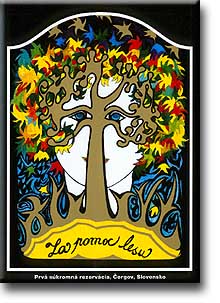 |
| Tree owner sticker |
Everyone who buys a tree receives a sticker saying “For Helping the Forest” and a certificate of a symbolic owner. Both documents were designed by a local artist. Owners are kept informed of the progress of the fundraising campaign and of the status of the reserve.
WOLF has been the official owner since January 1998. For the past two years WOLF has been organizing volunteers who work on weekends to protect the area from cars, hunters, wood-cutters and foresters. Since July 1999 WOLF has been putting its efforts into finishing the administrative designation process of the nature reserve. The whole process is too complicated and would be rather “indigestible”, let's say, for a private forest owner who would bravely decide to protect part of his land in a nature reserve. He would give up at the first hurdle and quickly forget the whole idea.
Perhaps most astonishing in the whole process was the need for approval of the reserve's name, “Wolf”, which we had to ask from the Central Terminological Commission at the Geodesic and Cartographic Office in Slovakia. The representative of the Commission's secretariat, Ms. Kovacova, has finally, a year (!) after receiving the application for the reserve's name, decided, by herself, on a completely different name – “Jarabincek”! What to do about this? We will continue to strive for the original name of Wolf, as it is one of a series of Wolf's protected areas.
We strongly believe – and will do the best we can to ensure – that the Wolf Reserve will be officially designated in the month of forests - April 2001.
The Wolf Reserve will be designated as the first private reserve of its kind in Central Europe and will become part of a core zone of what is known as an "evolution forest." A concept of "evolution forests," WOLF currently defines as forests of a minimum area of 200 square kilometers where all forestry activities will be excluded, is being defined in cooperation with the Technical University in Zvolen. WOLF proposes a division of the Slovak forests into two parts: an area of 4,000 square kilometers which would include 20 core zones of 200 square kilometers of “evolution forests” left totally untouched by humans and the remaining 16,000 square kilometers of forests would be commercial forests where sustainable management methods would be applied. Under the current forest management the majority of forest is considered to be commercial and as such logging is applied even when the forest is in a national park or a biosphere reserve.
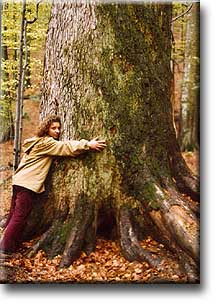 |
In response to WOLF's project of saving forest by becoming owners, WOLF received a donation of 37 hectares of forest land in the Strazovske Mountains in western Slovakia. The forest is predominantly composed of 100-year beech trees. One can also find pine, larch, elm and cherry trees. The oldest parts of the forest are 120 years old and the youngest forest stands have been growing for about a decade. As the forest is home to lynx, WOLF wishes its second private reserve to be called “The Lynx Reserve.” The donor, a doctor’s family, significantly helped WOLF to start the creation of a national framework of natural forest reserves in Slovakia.
WOLF believes that this example of generosity will serve as a precedent for other people who care more for the environment than for their own profit.
Both forests are considered commercial until they are officially declared reserves. Thus, they are managed according to current forest management plans. In Slovakia the plans are created by government and are binding for both private and state forest owners.
Since WOLF's objectives are entirely to preserve the forests, it will not implement any activities in its forests and will do its best to accelerate their designation as reserves.
Both forests are situated in springy areas and play a vital role in capturing water and replenishing groundwater supplies. They will become part of core areas of "evolution forests" which will become a basis of natural forest regeneration in Central Europe in a several decades.
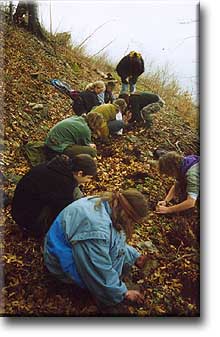 |
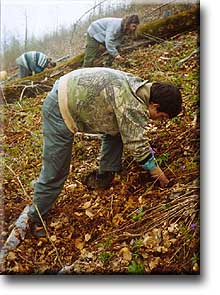 |
The natural forests, in contrast to the managed ones, are composed of mixed species of trees with a lush and diverse undergrowth and are able to regenerate themselves. They produce and protect healthy soils which are less susceptible to erosion from flooding. The natural forests are also more resistant to disturbances from wind, insect pests, etc. than managed forests. WOLF maintains that as the only truly viable forest is a natural one, it has to save these forests to achieve ecological stability in the area.
Follow up
In addition to The Wolf Reserve in the Cergov Mountains and The Lynx Reserve in the Strazovske Mountains, WOLF hopes to expand the forest it can help to protect. It plans to do so with land purchases, by encouraging contributions of land, and through its campaign for the creation of more state nature reserves. The protected areas will become parts of core zones of "evolution forests" (a concept on which they will keep working). The concept of "evolution forests" as WOLF now defines it has been accepted by the government and has become a part of the “Action Plan on a National Strategy on the Biodiversity Conservation in Slovakia.” WOLF plans to lobby responsible state bodies, especially the Ministry of Land Management, for main ideas of the "evolution forests" concept to be amended to forest legislation.
Conclusion
Every day WOLF receives letters from its members, forest contributors and people requesting information on WOLF and its activities. Here are quotations of some of them:
- “I was happy to receive information and a certificate of a symbolic owner which graphically is very beautiful and I’m proud of it. Thank you for both materials. I promise that although I’m retired and don’t have enough finances, I will put all my effort to save money for a purchase of one more tree in a near future.”
- “I favor so much all your valuable work. As I would like to help you, gradually I will buy trees for all my five grandchildren. I wish you much success.”
- “I would be so happy if you were successful in implementation of ideas on a creation of reserves and "evolution forests" which will be left untouched. It will not be easy but I keep your side... I believe that I will buy a tree in a near future. I praise your work.”
- “I am replying to your beautiful letter. Thank you very much for a sweet souvenir, a certificate of a symbolic owner as well as for a sticker and information on predators. I have a good feeling about saving the tree and wish it to grow nicely. I believe that your organization will be successful in all steps leading to the protection of this forest. I am just scared that the forest could be threatened by careless people. I wish you many other successes and joy in your work. I wish it brought wealth to all people of good will.”
- “I am 13 years old. I wanted to visit you in person but I was not able to manage it. I like nature and animals very much. I have been trying to become a member of any conservation organization with no success for two years. I believe to have a success this time... Please, send me your letter as soon as possible as I cannot wait.”
- “A day when we have received a letter from you was one of the happiest in our life. Our heart is with the nature. We try so hard to help it but a big number of bulldozers are everywhere. Our aim is to help conservationists in the field during our free time... PS: Is it possible to order a translation of a book “Of Wolves and Man” by B. Lopez from your editorial plan? PPS: We are enclosing our membership cards. There will be a wall poster on ‘our’ organization at our school soon.”
Many people have helped WOLF collect contributions, including members and friends of WOLF and non-government organizations in Slovakia and abroad cooperating with WOLF.
 |
"Without such selfless devotion of money, time and energy, " WOLF acknowledges, "it would not have been possible to save this area of forest. A heart-felt thank you to all contributors and helpers. We are thankful on behalf of every living creature and every plant in our forest stand. We are thankful on behalf of every stream, spring, soil and every stone. We are thankful on behalf of a living organism - the forest."
How you can help
The process of having the Wolf Reserve officially designated the first private reserve in Slovakia is coming to its successful conclusion. Thanks to people from all around the world WOLF needs to pay just the outstanding 810,000 SKK out of the total forest price 3.2 million Slovak crowns.
An appeal from WOLF:
If you would like to "buy" your own tree and so help to preserve natural forests by creating Central Europe's first private reserve of this type, please send US$ 30 (GBP 20 or DM 60) or whatever you can afford to our mailing address or pay it directly into our account:
Bank: Ceskoslovenska obchodna banka, a.s., pobocka Presov
Address: Hlavna 96, 080 01 Presov, Slovakia
Bank Account: 30079030
Swift Code: CEKO SK BX KOS
Name of Account Holder: Lesoochranarske zoskupenie VLK
We have an additional possibility for contributors in the USA: to make the check out to Rainforest Information Center and mail it to Earth Trust Foundation, 20110 Rockport Way, Malibu, CA 90265, USA.
You can also use our bank account in Germany:
Ökobank Freiburg, Sonderkonto VLK Mirko Olostiak, BLZ 500 901 00, Kontonr. 179 00 765
or in Great Britain you can send a check or postal order, made payable to The Wolf Society of Great Britain, to:
The Wolf Society of Great Britain,
49 Foxhill Road,
Reading, Bershire, RG1 5QS,
Great Britain.
For further information contact:
WOLF Forest Protection Movement
Address: c.d. 27, 082 13 Tulcik, Slovakia
Tel/fax: +421-91-7789488
E-mail: alfa@wolf.sk
WOLF has published many studies and leaflets on analyzing forest management in particular forest areas and proposing sustainable close-to-nature forest management (available in Slovak language):
- “Analysis of Contemporary Forest Management in the Cergov Mountains" and “Design of Alternative Forest Management in the Cergov Mountains," both by R. Midriak & team, Zvolen, Slovakia;
- “If I Were Chief Forester in the Cergov Mountains" by Chris Maser, Oregon, USA;
- “Influence Analysis of Human Activities on the Water Regime of Torysa and Topla River Basins" by M. Kravcik & team, Kosice, Slovakia;
- “Influence of Forest Management in the Slanske Mountains on the Water Retention Function of Forest" by J. Astrab;
- “Analysis of Flooding in the Watershed of Mala Svinka River" by J. Lukac, and
- a number of leaflets by J. Lukac, e.g. “Replenish the Springs,” “Forest for Life-Not for Death,” and “Let us Save Cergov” -- all leaflets describing adverse forest management practices and offering suggestions for changes in legislation related to forest management, and leaflets on the relationship between forest ecosystem stability and predators, e.g. “WOLF – Savior of Forest”, and “We Need Natural Forests – We Need Wolves, and Forest and Floods."
WOLF's other publications include posters, information/educational leaflets, stickers, and studies/analysis (some of which are listed above). The studies include an analysis of current forest management and proposals for future forest management. They stress the importance of avoiding unsustainable forest management practices that result in soil erosion and the loss of water retention and include recommendations to improve this situation. A Newsletter for members called “Howling” is being issued several times a year and occasionally also its English version. There are three English issues available, published in 1997, 1998 and 1999.
WOLF has thus far published twelve books:
- The Redesigned Forest by Chris Maser (Slovak translation)
- Our Old Village by Jan Lazorik (Saris dialect) - book is on preserving a cultural diversity, i.e. a dialect of the Saris region in Eastern Slovakia
- Deep Ecology by Bill Devall & George Sessions (Slovak translation)
- A Sand County Almanac by Aldo Leopold (Czech translation)
- Renewal of Traditional Utilization of Livestock Guarding Dogs by S. Findo (a Slovak field zoologist and researcher, in Slovak)
- Ecology, Community and Lifestyle by A. Naess (Czech translation)
- Thinking Like a Mountain by J. Seed and others (Czech translation)
- The Hidden Life of Dogs by E. M. Thomas (Czech translation)
- Gaia. A New Look at Life on Earth by J. Lovelock (Czech translation)
- The Monkey Wrench Gang by E. Abbey (Slovak translation)
- Active for the Earth by J. Haverkamp (Slovak translation)
and - State, Justice and Environment by J. Drgonec (a Slovak lawyer, in Slovak).
Articles and mentions on WOLF’s actions and activities available in English:
- One Tree at a Time. A fight to keep forests in central Europe off limits to all but the wildlife, A supplement to Time for Kids, Fall 2000
- Slovaks Oust 2006 Olympics, EF! Journal, November/December 1999
- Case Study: Wolves - unjustly persecuted and
Case Study: The World Bank in Slovakia, both articles published in Europe’s forests - A campaign guide, published by A Seed Europe, January 1999 - Slovakian Slag Olympic Ski Plan, EF! Journal, May/June 1999
- Slovakia, EF! Journal, December/January 1999
- Help Create the First Private Reserve in Central Europe - Buy Your Own Tree, Native Forest News, Final Quarter ‘98
- Wolves Around the World, Defenders, Fall 1998
- Slovakian Forests Protect Wolves, WOLF! Magazine, Fall 1998
- Battle for Polana - Activists blockade clearcutting in biosphere reserve, BBC Wildlife, September 1998
- Signs of Hope in the Polana Biosphere Reserve, Link, July/August 1998
- Slovakian Forests Dammed...
...Help Save Them - Buy Your Own Tree!, both articles published in the EF! Journal, June/July 1998 - Thousands Rally for Rivers on Day of Actions, World Rivers Review, No 2, April 1998
- ... and Poled and Slovaked - Year-round protection for wolves in two countries doesn’t stop the killing, BBC Wildlife, January 1998
In German:
Kaufen Sie sich einen Baum in der Slowakei! and Die Besetzung des Starina-Damms, Umweltschwung Osteuropa 1999, a calendar issued by Grüne Liga
Submitted by:
WOLF Forest Protection Movement
Address: c.d. 27, 082 13 Tulcik, Slovakia
Tel/fax: +421-91-7789488
E-mail: alfa@wolf.sk
- Login to post comments

Search
Latest articles
Agriculture
- World Water Week: Healthy ecosystems essential to human health: from coronavirus to malnutrition Online session Wednesday 24 August 17:00-18:20
- World Water Week: Healthy ecosystems essential to human health: from coronavirus to malnutrition Online session Wednesday 24 August 17:00-18:20
Air Pollution
- "Water and Sanitation-Related Diseases and the Changing Environment: Challenges, Interventions, and Preventive Measures" Volume 2 Is Now Available
- Global Innovation Exchange Co-Created by Horizon International, USAID, Bill and Melinda Gates Foundation and Others
Biodiversity
- It is time for international mobilization against climate change
- World Water Week: Healthy ecosystems essential to human health: from coronavirus to malnutrition Online session Wednesday 24 August 17:00-18:20
Desertification
- World Water Week: Healthy ecosystems essential to human health: from coronavirus to malnutrition Online session Wednesday 24 August 17:00-18:20
- UN Food Systems Summit Receives Over 1,200 Ideas to Help Meet Sustainable Development Goals
Endangered Species
- Mangrove Action Project Collaborates to Restore and Preserve Mangrove Ecosystems
- Coral Research in Palau offers a “Glimmer of Hope”
Energy
- Global Innovation Exchange Co-Created by Horizon International, USAID, Bill and Melinda Gates Foundation and Others
- Wildlife Preservation in Southeast Nova Scotia
Exhibits
- Global Innovation Exchange Co-Created by Horizon International, USAID, Bill and Melinda Gates Foundation and Others
- Coral Reefs
Forests
- NASA Satellites Reveal Major Shifts in Global Freshwater Updated June 2020
- Global Innovation Exchange Co-Created by Horizon International, USAID, Bill and Melinda Gates Foundation and Others
Global Climate Change
- It is time for international mobilization against climate change
- It is time for international mobilization against climate change
Global Health
- World Water Week: Healthy ecosystems essential to human health: from coronavirus to malnutrition Online session Wednesday 24 August 17:00-18:20
- More than 400 schoolgirls, family and teachers rescued from Afghanistan by small coalition
Industry
- "Water and Sanitation-Related Diseases and the Changing Environment: Challenges, Interventions, and Preventive Measures" Volume 2 Is Now Available
- Global Innovation Exchange Co-Created by Horizon International, USAID, Bill and Melinda Gates Foundation and Others
Natural Disaster Relief
- STOP ATTACKS ON HEALTH CARE IN UKRAINE
- Global Innovation Exchange Co-Created by Horizon International, USAID, Bill and Melinda Gates Foundation and Others
News and Special Reports
- World Water Week: Healthy ecosystems essential to human health: from coronavirus to malnutrition Online session Wednesday 24 August 17:00-18:20
- STOP ATTACKS ON HEALTH CARE IN UKRAINE
Oceans, Coral Reefs
- World Water Week: Healthy ecosystems essential to human health: from coronavirus to malnutrition Online session Wednesday 24 August 17:00-18:20
- Mangrove Action Project Collaborates to Restore and Preserve Mangrove Ecosystems
Pollution
- Zakaria Ouedraogo of Burkina Faso Produces Film “Nzoue Fiyen: Water Not Drinkable”
- "Water and Sanitation-Related Diseases and the Changing Environment: Challenges, Interventions, and Preventive Measures" Volume 2 Is Now Available
Population
- "Water and Sanitation-Related Diseases and the Changing Environment: Challenges, Interventions, and Preventive Measures" Volume 2 Is Now Available
- "Water and Sanitation-Related Diseases and the Changing Environment: Challenges, Interventions, and Preventive Measures" Volume 2 Is Now Available
Public Health
- Honouring the visionary behind India’s sanitation revolution
- Honouring the visionary behind India’s sanitation revolution
Rivers
- World Water Week: Healthy ecosystems essential to human health: from coronavirus to malnutrition Online session Wednesday 24 August 17:00-18:20
- Mangrove Action Project Collaborates to Restore and Preserve Mangrove Ecosystems
Sanitation
- Honouring the visionary behind India’s sanitation revolution
- Honouring the visionary behind India’s sanitation revolution
Toxic Chemicals
- "Water and Sanitation-Related Diseases and the Changing Environment: Challenges, Interventions, and Preventive Measures" Volume 2 Is Now Available
- Actions to Prevent Polluted Drinking Water in the United States
Transportation
- "Water and Sanitation-Related Diseases and the Changing Environment: Challenges, Interventions, and Preventive Measures" Volume 2 Is Now Available
- Urbanization Provides Opportunities for Transition to a Green Economy, Says New Report
Waste Management
- Honouring the visionary behind India’s sanitation revolution
- Honouring the visionary behind India’s sanitation revolution
Water
- Honouring the visionary behind India’s sanitation revolution
- Honouring the visionary behind India’s sanitation revolution
Water and Sanitation
- Honouring the visionary behind India’s sanitation revolution
- Honouring the visionary behind India’s sanitation revolution

